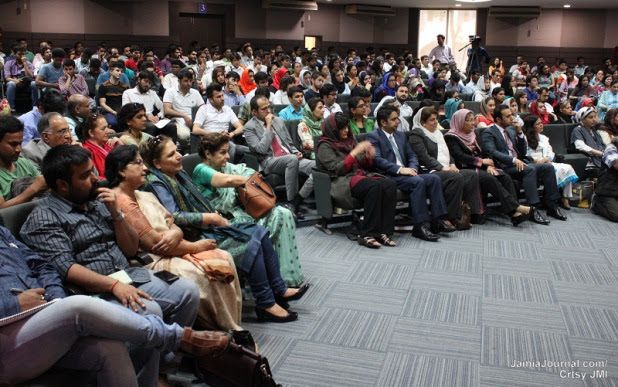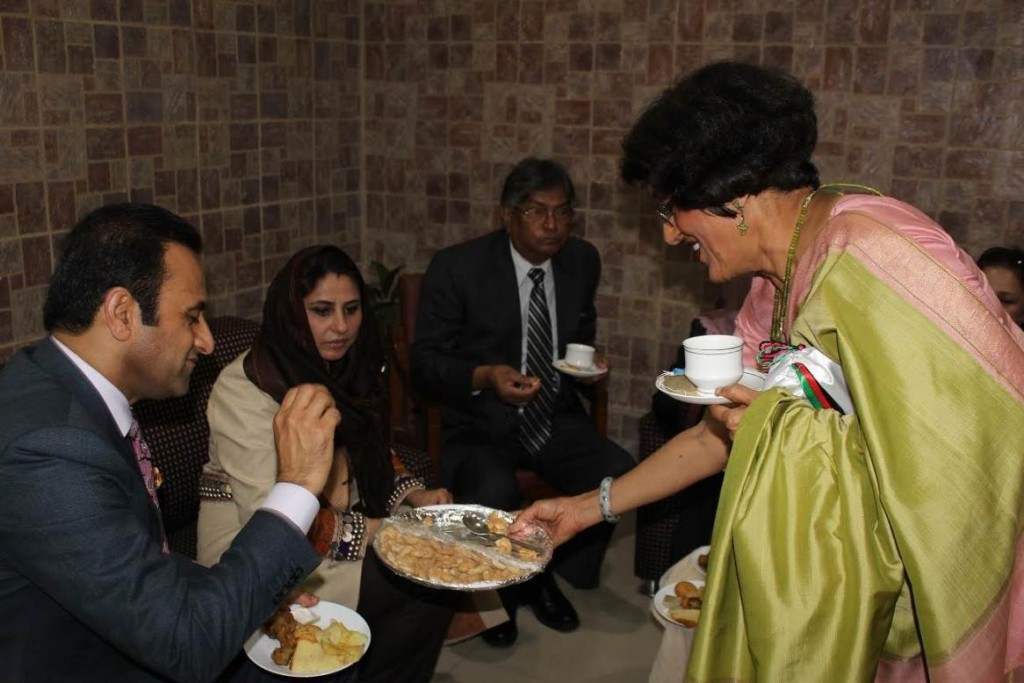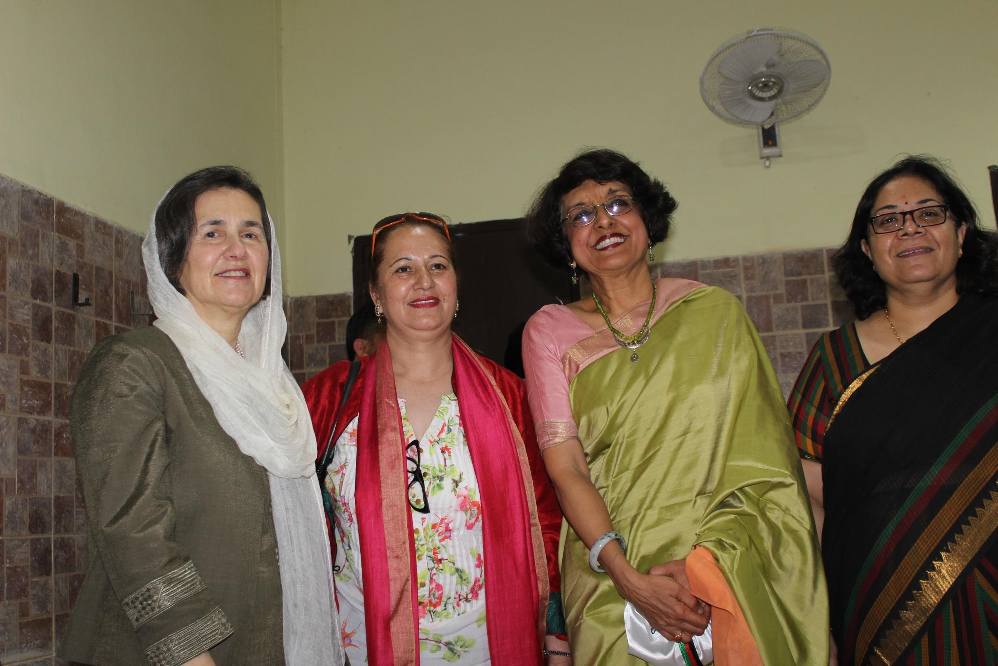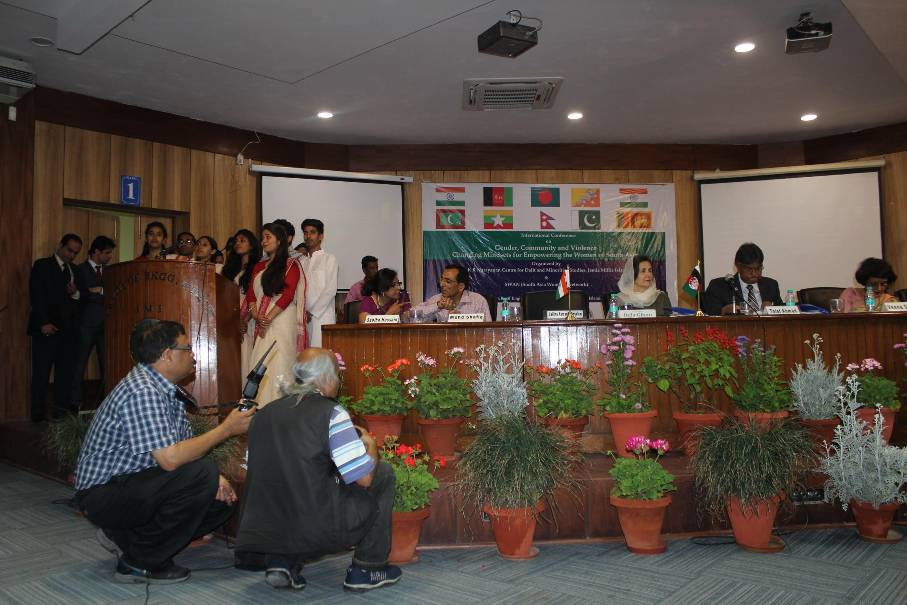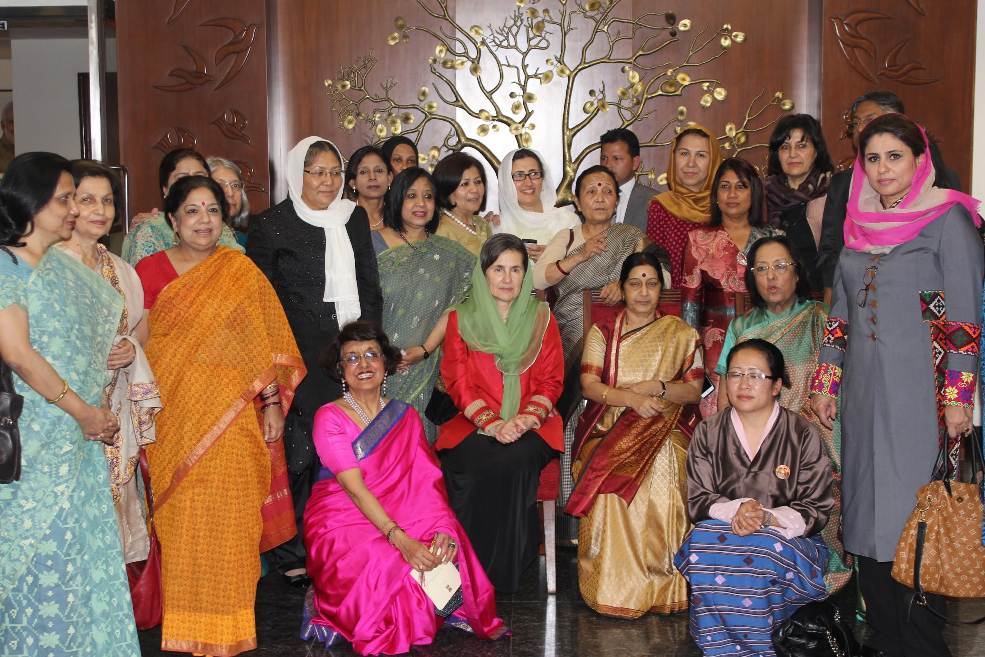Conference on “Gender, Community and Violence : Changing Mindsets for Empowering the Women of South Asia”, co-organised by SWAN and Jamia Millia Islamia University in New Delhi on 15-16 April, 2015
By
Professor Veena Sikri, Co-Convener of the Conference, and Founder, SWAN (South Asia Women’s Network)
The Conference on “Gender, Community and Violence : Changing Mindsets for Empowering the Women of South Asia” was held at Jamia Millia Islamia University, New Delhi on 15-16 April, 2015. This Conference was organised in collaboration between SWAN (South Asia Women’s Network) and the Dr KR Narayanan Centre for Dalit and Minority Studies (Jamia Millia Islamia). The Conveners of the Conference were Professor Veena Sikri, former Ambassador, and Founder of SWAN, and Dr Sabiha Hussain, Associate Professor, Dr KR Narayanan Centre for Dalit and Minority Studies, Jamia Millia Islamia.
The convening of this Conference was agreed upon at SWAN’s Sixth Annual Conference held in Thimphu (Bhutan) in September 2014. The principal objective of this Conference was to focus on the issue of the mindset change needed for bringing in gender equality, gender empowerment and sustainable development in South Asia. It is crucial to usher in this paradigm shift in mindset across the board : through the media, through participation of women in peace-building and conflict resolution, through educational curricula and the process of lifelong education, through inclusive good governance and elimination of violence against women. Mindset change has to be inclusive (all genders, adolescents and children). Mindset change, in order to have a positive impact on reduction and elimination of violence against women, should involve men and youth as part of the solution, so that they are ready and willing to provide every opportunity to women to participate as equal partners in the process of change that they seek. Among the major aims of organizing this conference in the university was to educate the younger generation on the nature of peace and avoidance of conflict, including through the promotion of tolerance and coexistence across different cultures, religions and ethnicities, and by working towards gender equality and empowerment.
The Inaugural and Keynote Address for the Conference was delivered by Her Excellency Rula Ghani, First Lady of the Islamic Republic of Afghanistan. Her address was very well-received by the large audience. She emphasized that “in South Asia, the proportion of women living on the margin of society is inadmissibly large…..each time we face a calamity, be it man-made, such as a conflict or war or be it a natural disaster such as floods, landslides or earthquakes, the most affected are the women. Having had little or no access to education, let alone to sources of funding, a large proportion of women do not have the tools to fight back adversity and to pull themselves out of poverty each time a calamity strikes”. Her Excellency Rula Ghani spoke at length about the “horrendous barbarity” of the killing of Farkhunda in Kabul on March 19, 2015. Yet, this dastardly act has galvanized the social conscience of men and women in Afghanistan. Farkhunda has become a symbol for justice and women’s rights, and across society, there is the recognition that “it will be difficult to return to the former status quo when only self-proclaimed religious leaders held the moral high ground at the expense of justice and the constitution”.
In her Special address, Smt. Lalitha Kumaramangalam, Chairperson, National Commission for Women, Government of India, said that we need to eschew band-aid approach to seek solutions to our social problems. She argued in favour of long-term solutions to evade the problems pertaining to violence against women in South Asia. In our march towards economic development, we need to follow the time-tested cultures of Asia that promote politeness and mutual respect for each other, she said. Women’s empowerment, she felt, should mean equal opportunities and equal access to all. Both men and women, she emphasized, have to be partners in growth to make women’s empowerment sustainable.
Presenting the objectives and outcome of the international conference, Professor Veena Sikri, Ambassador, Founder & Convenor, South Asia Women’s Network (SWAN) and Vice-Chairperson, South Asia Foundation (SAF-India) said that exclusion of women was hampering progress and prosperity in South Asia. An integrated approach was required to eliminate gender inequality, that was entrenched in our mindsets. It was important, she emphasised, that men are brought on board in becoming partners to undermine and change the mindsets rooted in patriarchy and hegemonic practices. Every institution needed to follow gender-budgeting, and furthermore to carry out gender-audits to sensitize itself on how to overcome the limitations that bedevil it. Women, she said, must be allowed to play a very constructive role in seeking solutions to conflict-ridden situations, since they were the first and the worst-affected victims of any strife and disaster, man-made or natural.
Highlighting Jamia’s contribution, Prof. Talat Ahmad, Vice-Chancellor, Jamia Millia Islamia said that this important international Conference being convened in Jamia was an indication about how strongly the institution felt in terms of women’s empowerment and gender equality. He said that it was necessary that women through education interrogated the inequalities around them and offered remedial measures. He rooted for equal opportunities for women in every walk of life. He drew the attention of the audience to the initiatives launched by the Outreach Programme of Jamia with regard to women’s empowerment and gender equality. Jamia has launched initiatives to strengthen access to jobs for its women students, and measures for women in the neighbourhood to enhance their employability.
Prof. Mohammad Shafiq, Dean, Faculty of Social Sciences, JMI welcomed the delegates and wished them a very productive and intellectually engaging stay on the campus. Dr. Sabiha Husain, Associate Professor, Dr. K.R. Narayan Centre for Dalit & Minorities Studies, JMI, and an active member of SWAN, presented the theme of the Conference, as covered under the seven working sessions. Professor Rumki Basu, Director, Sarojini Naidu Centre for Women’s Studies, Jamia Millia Islamia, proposed the votes of thanks
This important Conference had almost 60 participants. Of these, there were 25 participants from eight South Asian countries : Afghanistan, Bangladesh, Bhutan, Maldives, Myanmar, Nepal, Pakistan and Sri Lanka; and around 35 participants from India. The participants included parliamentarians, academicians, writers, researchers, media representatives and social activists.
Issues relating to changing mindsets for empowering the women of South Asia were discussed in seven thematic sessions, on the following sectors, covering the major issues facing the women of South Asia in their common quest for equality and empowerment :
- Violence Against Women : impact and challenges in its elimination, including through seeking justice
- Governance and Its Structures
- Education : new approaches for changing mindsets
- Women as Factors for Tolerance and Peace.
- Media, Art and Culture : Important Tools for Changing Mindsets
- Women-centric patterns for socio-economic empowerment and development.
- Bringing men on board for empowering the women of South Asia
More than 45 papers were presented by the participants from nine South Asian countries, Including India.
The Conference emphasised that ensuring gender equality and gender empowerment in South Asia is as much a developmental issue as it is a human rights issue. The denial of their rights has vastly excluded women from participating in or benefitting from the process of development. This is now a major factor hampering and holding back development, not just for women but for society as a whole. No nation can develop and prosper by leaving out women, who form half the population.
The genesis of the problems faced by the women of South Asia is complex and multi-facetted, with some aspects that could be specific to individual communities, ethnicities and religions. Yet, the people of South Asia share a unique cultural and civilizational heritage, including spiritual philosophies and knowledge systems. This shared diversity is South Asia’s core strength, with enormous potential for evolving common solutions for seemingly intractable problems, including those facing the women of South Asia. The papers presented at the Conference covered both specific problems and solutions that were common to all.
The most significant refrain, heard across all sessions, was that the crux of the problem lies in the firmly entrenched mindset towards women, a mindset that mitigates against respect, equality and empowerment for the women of South Asia. Essentially, the patriarchal system, as it has evolved, has ensured women’s subordinate role within family and society, and has exposed women to violence in its worst forms, has seriously reduced access of the girl child to educational facilities, and of mothers to healthcare, including maternal healthcare. Patriarchy and violence, including threats of violence, erode the very foundations of gender justice. They undermine and negate the objectives of constitutional and legal provisions favouring gender equality, and obstruct the advancement and empowerment of women in social, political and economic spheres of activity.
The patriarchal mindset and hierarchy has ensured that most government policies (across South Asia) have been gender-blind in their formulation and implementation, failing to give due weightage to the specific needs of women to help them overcome their disadvantaged position in society. This has only further strengthened patriarchal norms, and has denied to most women any substantive benefit from the process of economic development across and within the countries of South Asia. The Conference urges South Asian Governments to give special focus to ensuring that all laws are gender-sensitive in their formulation and implementation. Furthermore, the Conference urges South Asian Governments to accept the need for gender-responsive budgeting and gender-audit across all ministries and budgetary allocations, in order to ensure that the benefits of development are equally available to and accessible by men, women and children.
Across South Asia, the nexus between the patriarchal mindset and violence against women is direct and so deep-seated that it has defied every effort to uproot it. Violence against women destroys their self-respect and self-confidence, thereby inhibiting their ability to participate in public life, or even exert their authority within the family. Findings from a recent study conducted in Sri Lanka on masculinities, gender equality and violence, brought to the attention of the Conference by the delegate from Sri Lanka, revealed that two-thirds of the male sample had perpetrated sexual violence, including rape, for the first time between ages of 20 and 29, and one-third between the ages of 15 and 19. Furthermore, the key motivation for men to rape was their concept of sexual entitlement, their right to have sexual relations. This emphasizes that, if we seek to change mindsets, we need to work with young boys and adolescent men. There are two avenues for doing this : one is through the family, since the home-space is the one where “masculinist notions are born and perpetuated by those within”; and the other is through the primary and secondary school system, including non-formal education and sports associations. Young students, male and female, should be educated on issues such as sexual and reproductive health, prevention of gender-based violence and the promotion of gender equality. As we heard from the delegate of Bhutan, there are serious challenges in eliminating violence against women, including domestic violence. These challenges need to overcome even after the National Legislature has adopted the law on this subject, no matter how rigorous and stringent this may be.
The revolution South Asia needs in changing mindsets covers both men and women. The role of older women in the family is all-important. Older women, mothers and mothers-in-law, need to move away from the boy-child fixation that is so ubiquitous across South Asia. Women need to be pro-active in resisting the constant onslaught of opinion that relegates the girl-child to the fringes of family love and attention. Young women must be nurtured to acquire the self-confidence (through education and family support) that will give them the level playing field as they seek jobs or start their own families. As one of the delegates from Afghanistan told the Conference “When women respect themselves, and see themselves as strong and equal partners to men, men inevitably show respect…Women are born with their rights, and unless they give it away, no one can take it away”.
Innovative approaches to the educational process are vital for bringing in the much-needed mindset changes for empowering the women of South Asia. Educational curriculum should be reviewed to ensure gender-sensitivity and inculcating respect for women. Non-traditional methodologies, including street theatre, non-formal education, use of sports associations, and above all, the life-long learning approach should be inculcated for “changes in mindset amongst high and low in the political and bureaucratic establishments, including police and the judiciary”.
Delegates pointed out that across South Asia, women’s role continues to be seen as confined to the family, to reproduction, and to house-work. She remains ‘economically invisible’ since the value of her work goes un-estimated and un-included in GDP statistics, even when she is responsible for the lion’s share of the work, including in the agricultural sector. In increasing instances where women in urban areas are holding responsible jobs, the burden of home-care continues to fall primarily on her shoulders, since in South Asia, the concept of sharing domestic responsibilities is still largely absent. Delegates supported women-centric patterns for socio-economic empowerment and development. Women are the repositories of traditional knowledge, be it in healing remedies, cuisine, folk legend, and traditions of dance and music. Yet they are the worst sufferers of ill-health, be it the result of inadequate access to medical facilities, or just malnutrition due to poverty and social tradition that forces them to be the last to eat in the household, even if they are pregnant or lactating. In order to improve abysmal health standards across South Asia, the Conference emphasized that women be made the focal-point for all government and NGO interventions in the health sector. As one speaker in this segment said, the socio-economic empowerment of women “does not happen with a request. It occurs when we demand, when we are well-informed, when we persevere and most importantly, when we work on the issue together”.
Discussions at the Conference focused on policy recommendations, advocacy programmes and networking in order to achieve the stated objectives. The Conference agreed upon innovative initiatives that need to be taken at the grass roots, community and policy-making levels across South Asia, so as to create sustainable models for the future, bringing in the centrality of women’s empowerment as an intrinsic part of this process. There was strong consensus among the participants on non-violence as the methodology of choice for all situations; on supporting the role of women as peace-leaders through appropriate capacity-building; on ensuring that women and the girl-child have easy and sufficient access to education and life-long learning; on ensuring adequate representation of women in all mechanisms and institutions of governance.
In follow-up of the discussions and decisions of this Conference, SWAN is preparing several major initiatives. Significant among these is the proposed initiative on “Changing Mindsets through Education”. Inculcating respect for women, and appreciation of the need for gender equality and women’s empowerment, is a process that can succeed only if it commences through the education process, beginning with the primary levels. Values imbibed at young ages, whether in the family or at school, stay embedded in one’s psyche, with lifelong impact. This can play a significant role both in eliminating the cruel spectre of violence against women, and, with great effect, bring men on board for empowering the women of South Asia.
The discussions and decisions in the session on “Media, Art and Culture : Important Tools for Changing Mindsets” are being incorporated in to the recently launched UNESCO SWAN Initiative on Building a Gendered Media, bringing in the issues of changing mindsets as a key element. The discussions and decisions in the session on “Governance and Its Structures” built upon the exchanges already underway after the Conference on “Democracy and Inclusive Good Governance for Gender Equality and Sustainable Development in South Asia” convened in Kathmandu in May 2014 by SWAN in association with Indira Shrestha, Chief Executive, Shtrii Shakti, Kathmandu, and Deepak D. Tamang, Executive Director, SEARCH-Nepal, Kathmandu. Here, too, the focus on changing mindsets is an invaluable dimension that can make an immense contribution to achieving the objectives of gender equality and gender empowerment through democracy and inclusive good governance.
https://www.youtube.com/watch?v=SbLcAJ-jxEQ
https://www.youtube.com/watch?v=2laPWVYl8YA
https://www.youtube.com/watch?v=RU1vJ47-p8k


